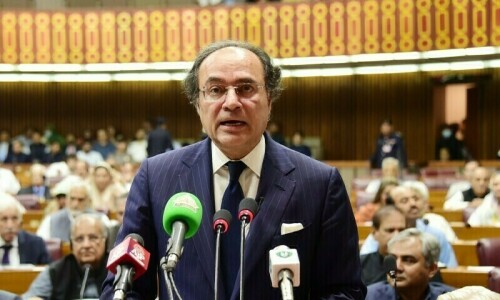The four-day book-building process for the divestment of the government’s 250m shares in Habib Bank Limited, the country’s biggest bank, which concluded Friday, left the Privatisation Commission licking its fingers and counting the cash it had realised from the sale.
The government is all set to sell its 41.5pc or 609.3m residual shares in the bank to local institutional as well as foreign buyers, including those in London and New York, through the book-building process. It visualises Rs129bn in the kitty from the sale of the 609.3m shares in two stages.
HBL’s is the fourth privatisation transaction undertaken by this government. After a lapse of eight years, the process was set rolling last summer with the sale of 241m shares (19.8pc) of United Bank Limited (UBL) for $387m. A fortnight later, the government disposed of 70.06m shares (5pc stake) in Pakistan Petroleum Limited (PPL) for Rs15.3bn. This was followed by the sale of the government’s remaining 12m shares (11.5pc holding) in Allied Bank Limited (ABL), which fetched it Rs14.4bn.
The government has lost out on dividend income of Rs2.66bn from UBL, Rs858m from ABL, and Rs875m from PPL. And it would be poorer by Rs7.31bn in case it sells its entire residual shareholding in HBL
However, one deal that did not go through involved the country’s largest oil and gas exploration company, OGDC.
In the federal budget 2014-15, the government had targeted Rs198bn from the privatisation process, and that may still be achieved. But many people watching the process believe that in selling the ‘family silver,’ the government is sacrificing future income.
A little accounting would make the picture clear. In calendar year 2014, HBL distributed a dividend of Rs12 per share to its shareholders, while UBL paid Rs11.50; ABL Rs6.50; and PPL Rs12.50 on each share.
Back of the envelope calculations show that in disposing of its stake in these enterprises, the government has lost out on dividend income of Rs2.66bn from UBL, Rs858m from ABL, and Rs875m from PPL. And it would be poorer by Rs7.31bn in case it sells its entire residual shareholding in HBL. All of this adds up to Rs11.7bn.
In the budget 2014-15, the finance minister had targeted Rs82bn in dividends from the government’s holdings in state enterprises, up from Rs77bn in the previous year. But the sale of shares in the above-mentioned companies would reduce these receipts by 15pc from next year, given other things remain the same.
So does it make sense to sell the geese that lay the golden eggs? “Absolutely not,” asserts former finance minister Dr Hafiz A. Pasha. Now a professor emeritus at the Lahore School of Economics, Dr Pasha told this writer that he was at a loss to understand the current privatisation process. He recalled that the PML-N government had mentioned in its election manifesto that the focus would be on restructuring and selling off loss-making state-owned enterprises. “There was no mention of selling profitable assets.”
He conceded that selling companies that earn huge revenues would deprive the country of income in the form of handsome dividends and capital gains.
Several attempts to seek comments from Privatisation Commission Chairman Mohammad Zubair did not bear fruit, as he said he was in London and ignored both written and verbal queries. A PC official, who asked not to be named, made feeble attempts to defend the policy.
“It was essential to begin the privatisation process by offering profitable listed banks and companies that have a credible track record so as to attract the interest of international buyers.”
But a former PC official pointed out that under the Privatisation Ordinance 2000, 90pc of privatisation proceeds had to be utilised for retiring public debt and the remaining to alleviate poverty.
“Never in my term at the commission did I see the proceeds being used for poverty alleviation; they were always utilised to tide over the budget deficit,” he asserted. Most economists concurred that it was unwise to retain the ugly ducklings and sell the geese that lay the golden eggs.
And there are scores of such perennial loss-yielding companies that are consistently dragging down the economy and the government’s finances.
For instance, Pakistan Steel Mills is churning out Rs20bn in losses every year. The Pakistan International Airlines’ accumulated losses mounted to Rs207.69bn from 2011 to June 2014, while nine electricity distribution companies suffered line and administrative losses worth a staggering Rs211bn. Add to that the losses contributed by Pakistan Railways and Wapda, and it is a frightening picture alright.
Another economist argued that by sacrificing income and dividends from profitable state-owned companies, the country’s economic managers would have to resort to levying further withholding taxes and sales tax to contain the fiscal deficit.
Published in Dawn, Economic & Business, April 13th, 2015
On a mobile phone? Get the Dawn Mobile App: Apple Store | Google Play













































